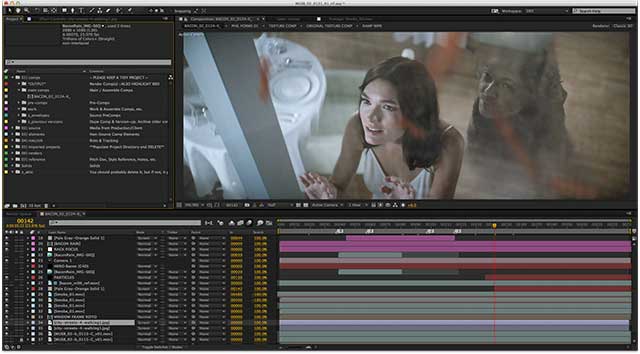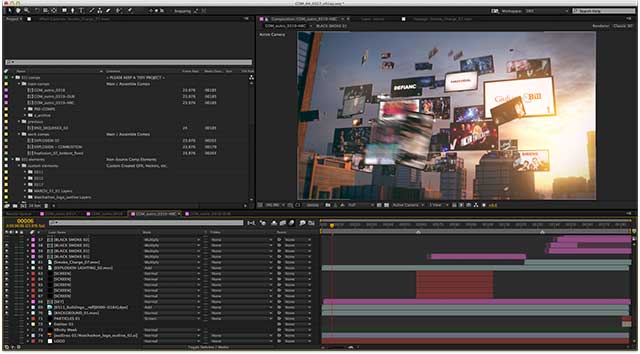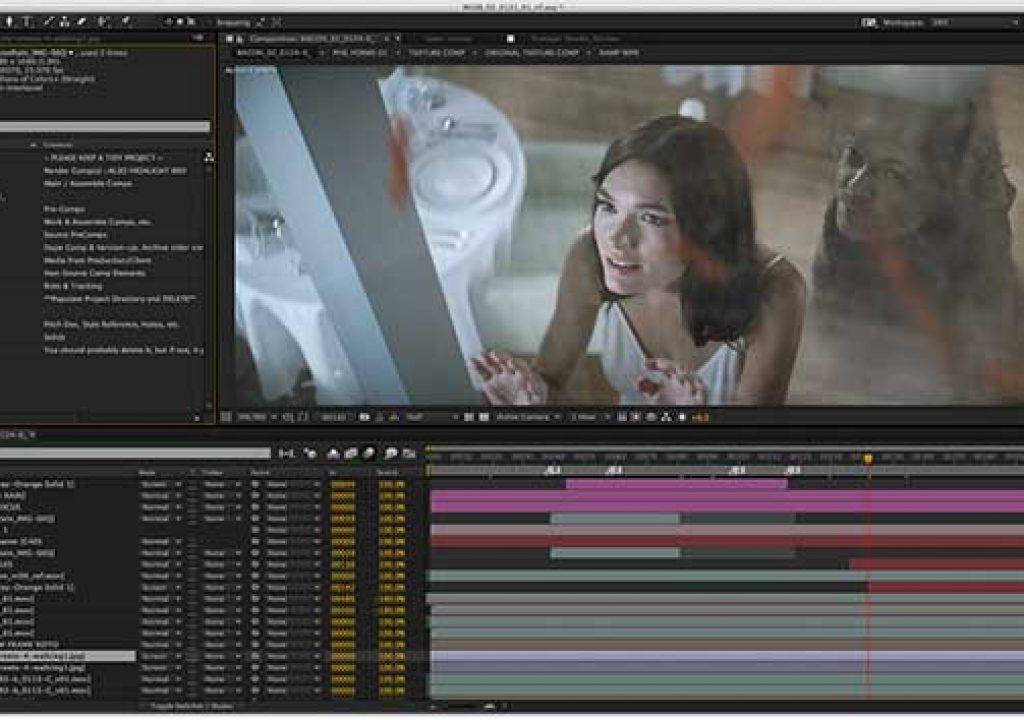Located in the historic Silver Lake neighborhood in Los Angeles, Coyote Post offers clients a range of post-production services, from editorial through to final color. Only a couple of years young, the studio has assembled a talented team of video editors, visual effects artists, graphic designers, and expert colorists. Top-notch editing suites are equipped with the most current tools, including Adobe Creative Cloud. Creative Director Martin Desmond Roe and Executive Producer Rik Michul are two of the creative minds that help deliver stunning film, commercial, and music video projects for clients.
Adobe: How did each of you become part of the team at Coyote Post?
Roe: As an undergraduate I studied Latin and Ancient Greek. Through the process of putting on plays I became fascinated with storytelling and acting. That led me to the University of Southern California where I decided to focus on film editing. After a stint in London directing music videos I came back to the United States and started Coyote Post. We’re a team of talented freelancers and we work closely with other companies like Flawless FX and Dirty Robber. It’s really a team comprising the best of the best.
Michul: I went to the University of Kentucky and studied finance, thinking it was a practical career choice. But then I realized that I needed to be in a more creative environment. I landed my first production job with Earthquake Productions where I soon met Director Philip G. Atwell of Geronimo Film Productions and worked with Philip and music producer Dr. Dre at Geronimo for eight years producing music videos, commercials and other content. After that, I helped start up a post house called bonch and then moved on to work on the 3D animation film Free Birds. After that, I just started looking around. I met the Coyote Post guys, we clicked, and here we are.
Adobe: What kind of work does Coyote Post do?
Roe: We started off just doing color correction, but now we do everything: editorial, VFX, color and online. We’ve been involved in several high-profile projects including feature films for LionsGate and MTV, music videos for labels like Universal, Warner Bros and Sony, and commercials for agencies including Goodby, Silverstein & Partners.
Most recently, we worked with production house Dirty Robber on a fun spot for the “Wake Up & Smell the Bacon” campaign for Oscar Meyer. The campaign even includes a device that can be plugged into an iPhone that sprays the smell of bacon frying and makes a sizzling sound when your alarm goes off. The video has gotten upwards of four million hits.

Final comp for Bacon Rain for the Oscar Mayer spot combining 422 footage, animation codecs of stock footage, image sequences of 3D hero bacon, as well as particular driving lesser bacon sprites.
We also did a spot for Comcast XFINITY promoting its on-demand programming. We were up against some big established post houses with more traditional technical pipelines for that business, so it was one we were proud to land.

Composition for end shot of Comcast spot. Shot began with a Cinema 4D project integrated into Adobe After Effects. The final version plates for 3D were rendered from Cinema 4D and brought back into the timeline as multipass image sequences.
Adobe: Do you have employees or do you primarily work with freelancers?
Michul: We have two main VFX leads that are the lifeblood of that department along with an inner circle of freelance artists who we work with or try to hire on every job. We continually try and build our freelance rosters so we can expand and contract our VFX crew to stay flexible and efficient for our ever changing workflow. Some of those freelance jobs can carry on for weeks or months at a time depending on the workflow and overlap of projects.
Adobe: How do you keep all of your freelancers on the same page during a project?
Michul: We have great production supervision and management from our staff. Our VFX leads are excellent leaders when it comes to managing the workflow, putting the right artist on the right task, and having the entire team working in unison to a high standard to achieve the common goals of the final product.
Adobe: Can you tell us about the tools you use in your workflow?
Michul: We are heavily into Creative Cloud. All of our editors have switched to Premiere Pro and After Effects is a mainstay, as is Photoshop. We love Creative Cloud because it is seamless going from platform to platform, and everything in Premiere Pro gets updated in After Effects and vice versa, so our process is very streamlined.
Final comp of Wasteland for the Oscar Mayer spot.
Adobe: What does the Adobe pipeline mean to you from a business standpoint?
Roe: With Creative Cloud, everything is well integrated, and that equates to efficiency. As a young, hungry company, we need to prove ourselves in a competitive market. We can be highly adaptive and go back and forth between editorial and effects. The important thing is to remain nimble and fast, and to be able to multi-task. One day we are primarily an effects house, the next an editorial house. Creative Cloud lets us handle a range of post-production demands and more easily meet client deadlines and budgets.
Adobe: What are your editors saying about Adobe Premiere Pro CC?
Roe: I think one of the most common things I hear from our editors is that Premiere Pro is intuitive, elegant, and easy on the eyes, yet it has the high-end professional features we need. Its competitors may have much of the same functionality, but the applications look boring and complicated—so they are not enjoyable to work with day in and day out.
Our editors are constantly at work on productions involving all types of formats. More often than not, the client needs a lightning-quick turnaround. Getting media into After Effects from Premiere Pro is a matter of copying and pasting clips; there’s no painful and time-consuming rendering, exporting, and importing of media in order to go back and forth.
The ability to open all different types of media in Premiere Pro is also extremely handy, especially because Coyote Post typically receives raw format files from many different camera types for the same project. We can edit any format natively, saving countless hours of transcoding, re-linking, and creating onlines.
Adobe: Which features stand out in Adobe After Effects CC for your VFX teams?
Michul: Our teams rave about the integration between After Effects, Premiere Pro, and Photoshop because they can move back and forth between editorial timelines and graphics comps effortlessly. Our VFX artists like the new features complementary to the Roto Brush tool in After Effects. The New Keyer effects help us to clean keys and the Refine Edge tool helps us fine-tune edges when isolating objects—a process that would normally be massively time consuming.
The new camera tracker combined with CINEMA 4D integration in After Effects has improved the workflow for match-moving cameras among programs. Also, because we’re a collective of smart, independent freelancers, the ability to keep work organized in folders in After Effects is crucial for hand-offs to artists further down the pipeline. Finally, everyone can bring in multiple different formats and use them all in a single workspace, whether we’re working with high-scale budgets, small budgets, motion control rigs, green screens—whatever variables are involved.
Using the camera tracker to track a plate for Comcast spot that will integrate a 3D rendered flat screen. Keylight being used to key the chroma green background that will also lead way to a 3D set extension.
Adobe: What’s your reaction to Adobe Creative Cloud overall?
Roe: We love having access to all the applications and updates at any time and installing just what we need. We can expand our creative toolkit if we want to include tools such as Bridge, Media Encoder, or Encore. Creative Cloud takes the headache out of customizing every workstation for individual preferences and needs.
The bottom line is that Creative Cloud makes us more adaptive as a small post house. We have our fingers in commercials, music videos, features, and TV. Because we are nimble and creative, we get interesting work that keeps our talented artists engaged and wanting to excel. One of our driving forces is to do good work, and Creative Cloud makes that far easier because we spend less time on technicalities and more time on creativity.
Learn more about Adobe Creative Cloud
Download a free trial of Adobe Creative Cloud


